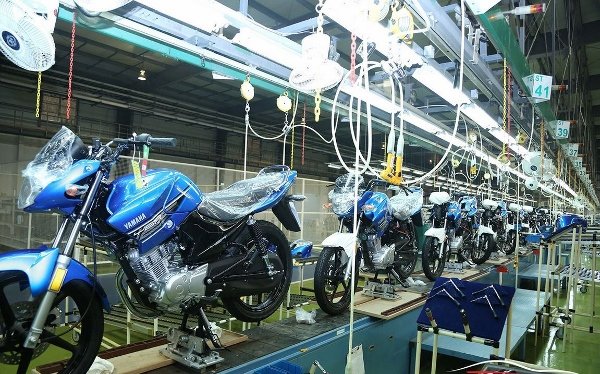Yamaha Motor Pakistan (Pvt.) Ltd. has announced it will discontinue local motorcycle manufacturing—a decision that resonates far beyond the auto industry. In a country often described as a “motorcycle nation,” where millions rely on two-wheelers as a lifeline for daily mobility, Yamaha’s exit is not merely a corporate move but a stark reflection of Pakistan’s deeper economic and policy challenges.
This decision carries a weight far greater than the loss of a brand. When a global name departs from a market, it sends signals far beyond its balance sheets. It tells potential investors that Pakistan is a high-risk market, amplifying the “risk premium” attached to any new venture here. Yamaha’s exit is not just Yamaha’s story; it is a sobering reminder that each corporate departure adds layers of hesitation for those considering entry.
A Pattern of Corporate Exits
Yamaha’s decision is not an isolated event. In recent years, several multinational giants have wound down operations in Pakistan. Among them:
-
Microsoft scaled back its engagement.
-
Uber shut down its direct ride-hailing services.
-
Careem, once a homegrown success story later acquired by Uber, downsized its role.
-
Telenor began looking for exits in telecom.
-
Shell and Total Energies, major players in the fuel sector, retreated.
-
Pfizer, Eli Lilly, and Sanofi, pharmaceutical giants, closed local units.
-
Procter & Gamble scaled down operations.
-
Lotte Chemical wound up its presence.
Each exit reinforces a perception: Pakistan’s market, though vast, is unpredictable, costly, and unsustainable for long-term planning. For a nation with 240 million people, such exits should raise alarm bells.
Why Do Companies Leave?
Despite the enormous consumer base, the underlying reasons for withdrawal are depressingly consistent:
-
Economic Uncertainty – Frequent policy shifts, unstable taxation structures, and inconsistent regulations make long-term investments risky.
-
Currency Depreciation – The Pakistani rupee’s sharp decline in recent years has made imports costlier, eroded profits, and priced many products out of consumers’ reach. For Yamaha, motorcycles that once appealed to middle-class families increasingly became unaffordable luxuries.
-
Regulatory and Import Restrictions – Delays in approvals, high tariffs, and bureaucratic hurdles discourage companies dependent on imported raw materials or components.
-
Heavy Taxation – Complex tax regimes and sudden impositions of duties erode competitiveness.
-
Foreign Exchange Shortages – Multinationals often struggle to repatriate profits, creating financial bottlenecks.
-
Policy Instability – No company can plan a 10-year strategy in a country where policies change with every new government or finance minister.
For Yamaha, all these challenges converged. With affordability shrinking due to falling purchasing power, demand tilted toward cheaper, lower-quality local or Chinese alternatives. Yamaha’s brand strength in “quality” could no longer offset the harsh reality of affordability.
The Symbolism of Yamaha’s Departure

The exit of Yamaha is not just about motorcycles. It symbolizes a deeper malaise. Multinationals make decisions based on hard numbers, not emotions. If a brand with decades of heritage, global supply chains, and strong consumer loyalty cannot survive, what message does it send to newer investors considering Pakistan?
Each departure raises new questions for potential entrants:
-
If global companies cannot sustain here, how can a newcomer?
-
If foreign exchange shortages block profit repatriation, why invest?
-
If consumer purchasing power keeps shrinking, where is the demand?
Thus, Yamaha’s exit will not only reduce choices for consumers but also complicate Pakistan’s image as an investment destination.
When Politics Overshadows Economics
In parliamentary democracies, a vote of confidence or no-confidence motion is an instrument of political accountability. However, in Pakistan, politics often resembles a theater where leaders treat governance like a personal chessboard. As the saying goes, politicians here are treated no better than herds, moved by shepherds rather than genuine representation.
But in reality, the true confidence or no-confidence motions are passed not in assemblies but in boardrooms of multinational corporations. Each decision to invest or exit is a silent yet powerful referendum on the country’s governance, stability, and economic direction.
While political actors busy themselves with survival games, foreign investors cast their vote with their feet. Yamaha’s exit is another such “motion of no-confidence” against Pakistan’s economic environment.
A Market Betrayed by Its Own Potential
Pakistan should have been a magnet for motorcycle manufacturers. With urban congestion, limited public transport, and growing populations, two-wheelers remain the most practical solution for millions. Instead, mismanagement turned this opportunity into a liability.
Where other countries have leveraged similar conditions to attract investment and expand local manufacturing, Pakistan has driven away established players. Consumers are left with fewer quality options, and the economy loses jobs, technology transfers, and tax revenues.
The Broader Implications
The implications of Yamaha’s departure extend beyond motorcycles:
-
Consumer Impact – Middle-class families will have fewer options for reliable two-wheelers, and the absence of competition may lead to price hikes from remaining players.
-
Employment – Thousands linked to Yamaha’s supply chain, dealers, and service networks will face uncertainty.
-
Investor Sentiment – Each corporate exit adds weight to the “Pakistan risk premium,” making capital costlier for future entrants.
-
Image Damage – In global investment circles, perception is reality. With every withdrawal, Pakistan’s image as a market worth betting on takes another hit.
Can This Trend Be Reversed?
The question is not whether Pakistan has potential—it clearly does. The real issue is whether the system can provide an enabling environment where investors feel secure. This requires:
-
Policy Stability – Assurances that investment rules will not change overnight.
-
Currency Management – Measures to reduce volatility in exchange rates.
-
Ease of Business – Streamlined import processes, predictable taxation, and reduced bureaucratic red tape.
-
Consumer Support – Policies to stabilize inflation and improve purchasing power.
-
Trust-Building – A government that listens to industry concerns and acts consistently.
Without these reforms, the exodus will continue, and the market of 240 million will remain a wasted opportunity.
Conclusion: When Will Pakistan Wake Up?
Yamaha’s departure is more than the end of a motorcycle assembly line—it is a mirror reflecting Pakistan’s governance failures. While politicians debate motions of confidence inside the assemblies, the real world outside is passing its own verdict. Every multinational exit is a silent declaration: “We have no confidence in your economy.”
The tragedy is not just that companies are leaving. The tragedy is that policymakers are not listening. In a country blessed with resources, talent, and one of the largest youth populations, it is not scarcity of opportunity but scarcity of vision that holds us back.
The final question remains: when will our leaders awaken to this reality? When will Pakistan become a place where investors stay, grow, and thrive—rather than a market they flee? Until then, Yamaha’s exit will be remembered not as the last, but as another chapter in a long list of lost opportunities.



